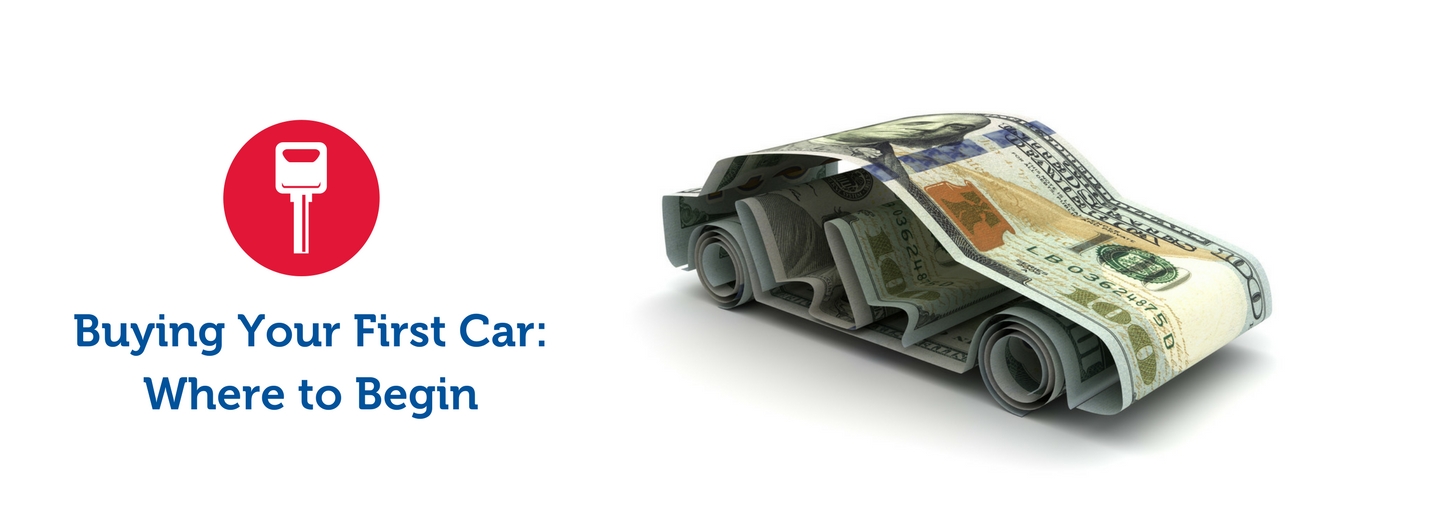Buying Your First Car

Your first car – seems like it was just yesterday you were popping the training wheels off your bicycle and couldn’t imagine a more liberating feeling. This is one purchase you’ll be sure to not forget, and there’s a lot to keep in mind before stepping on the gas!
Research, research, research
Do your research before you start shopping. Research the suggested retail price for the vehicle(s) you’re interested in from various credible sources like Kelley Blue Book’s online comparison tool or NADA Guides. If you research pricing and the value of vehicle options, your knowledge of what the bottom line looks like will come in handy when negotiations begin.
Unless you have thousands of dollars sitting in your account, you will need to finance your new purchase. Most consumers who have a long history with their current financial institution will just call the ones they know and trust. If you are purchasing and financing your first car, you may need a little more guidance. Credit Unions are known for competitive rates and amazing service. *ahem* We are people helping people! ;) Anyway, start by calculating how much of a monthly car payment you can afford; that will tell you your maximum purchase amount. Then, when you find the right financial institution, give them a call to discuss your options.
Some things to consider
There’s a lot more to a car than just the physical attributes. Usage, location, and future plans are all just as important when making this decision. For instance, if you have an hour commute each way to work, you might want to avoid the gas-guzzling monster machines, especially if gas prices continue to be unpredictable. Consider things like typical number of passengers, where you’ll be going (daily mileage), where you’ll be parking, what your current and expected living arrangements may be, length of time you’ll want to have it (especially if making payments), for what you’ll be using it (i.e., do you care more about towing ability or fuel efficiency?).
Stay on track with your needs; don’t get blinded by your wants.
If all you require is a frame and four wheels, then your options are pretty unlimited. However, if you like all the latest gadgets, you’ll need to factor those in when considering your purchase price. Luxury and upgrades come with an upgraded price tag as well. A touch screen GPS-and-sound-system, fancy floor mats, heated steering wheel, and heated/cooling cup holders (and, yes, these exist) might sound pretty cool, but if you’re paying an extra couple grand on unnecessary features, is it really worth it? Guess what…a separately purchased GPS system & good ol' pair of gloves may run you $100 total. Smart shopping will ensure you still have some spending money after your bills are paid each month! Consider decking out the standard model yourself.
Drive a hard bargain
Don’t be afraid to say no. If you don’t feel like you’re getting the deal you want or can truly afford, don’t hesitate to walk away and explore other options or dealerships. Ask your financial institution from which dealership they would recommend purchasing a vehicle. They know the dealers and can help guide you!
Confidence in numbers
Bring another person with you. Someone with a background in mechanics or overall car knowledge is an advantage, but even just bringing a friend or family member along can make all the difference. For instance, when you test drive the car, you’re probably going to keep most of your focus on driving (we hope). A friend may notice other things like a huge lack of cup holders – important stuff. They may even be able to bring you back down to reality if you fall in love with the shiny convertible sitting in the show room.
Add-ons and so on
Heated seats can increase the amount you see on the bottom line of the contract - this also goes for warranties, related inclusions, and other add-ons, such as roadside assistance, so stay in the negotiating mindset. Don’t forget to compare the prices of other similar products. Most financial institutions offer similar products at a much lower cost to the consumer. Don’t forget to see what added value the dealership can offer you…we’re talking PERKS. Many dealers partner with other vendors to provide additional warranties, discounted applications like GPS software or satellite radio, gas cards, lost key prevention programs, free oil changes/car washes, etc. It never hurts to ask.
Now you know!
Now you have some basic tools to help you get started on making one of the biggest purchases of your life. It’s really not that bad, otherwise people would keep their cars forever! Just kidding – who does that? Nothing beats that new car smell!
By Campus USA at 27 Jul 2017, 12:04 PM